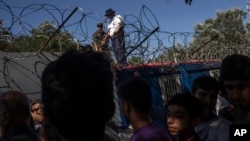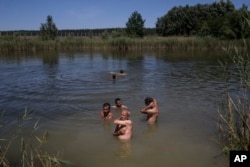The United Nations refugee agency reports Hungary's increasingly restrictive policies have caused a pileup of more than 1,400 refugees and migrants — mainly women and children — at the Serbia-Hungary border. Most are Afghans, followed by Syrians and Iraqis.
The Hungarian government has beefed up its border security with 10,000 soldiers and police, as well as drone and helicopter surveillance, says UNHCR spokesman William Spindler.
Since new legislation came into force authorizing police to intercept asylum seekers, 664 people have been sent back into Serbia through the fence — often to remote areas without adequate services, according to Spindler.
"UNHCR has continued to receive reports of abuse and violence occurring when people were apprehended within the transit zones, or in police detention facilities,” he said. “Reports include cases of bites by unleashed police dogs, the use of pepper spray and beatings."
Hungary rejects such accusations. However, independent investigations by organizations such as Human Rights Watch and Amnesty International have arrived at similar conclusions.
Hungary has set up several so-called transit zones, where 15 individuals are admitted each day to submit an asylum claim. Spindler says the conditions for people waiting to enter those zones are dire, with individuals and families staying in the open or in makeshift tents on muddy fields next to the fence.
The fear, he says, is that these inhumane conditions might prompt people to use unscrupulous human smugglers, placing them at further risk. Hungary’s actions, the U.N. agency adds, violate European Union and international law and should be rescinded.
"Hungary is a signatory to several legal instruments, including European legislation on human rights and asylum, and there are sanctions that can be undertaken by the European Union in this matter, but we would have to wait and see what would happen there," Spindler said.
The UNHCR has again written to the Hungarian Interior Ministry to remind officials of their obligations and to urge them to investigate reports of abuse. So far, there has been no reply.





